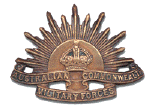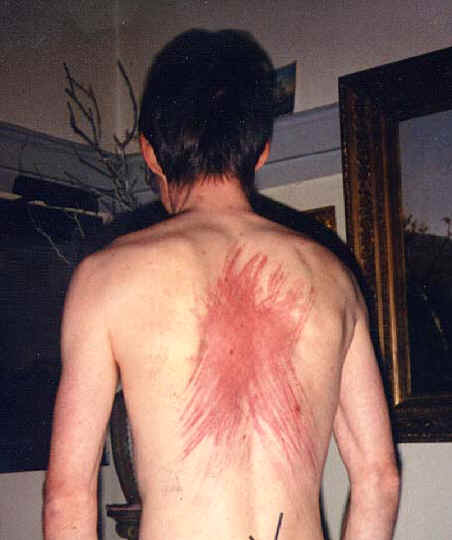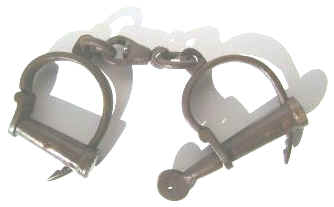 |
|
|||
| Military justice in
colonial days was harsh. Execution was common. Lashes (being struck with
a whip) were administered in the hundreds at a time and sometimes the
prisoner died as a result. He was often scarred for life. Often the whip
was the dreaded "cat 'o nine tails" which was a whip with nine
separate woven tails with a knot and three strands at the end of each one.
See
photo below
The First Fleet sailed from Spithead, England on 13th May 1787 carrying food, clothing & other supplies for 2 years.568 male, 191 female convicts & 13 children, 206 Marines with 27 wives, 19 children & 20 officials travelled 15,000 miles in a little over 8 months to reach Australia.
20% of the first convicts transported were women, most were in their middle 20's, a few were early teens , several were aged, one was 82 years. 50% had been tried in Middlesex, some at county Assizes (Devon, Kent & Sussex), the rest were at Quarter Sessions. Most common crime was theft, of money, clothing or food. No convict of the First Fleet was convicted of a political crime. Nearly all were English from London & its suburbs, principal cities & towns. The first criminal court was assembled on 11th Feb 1788. President was Judge Advocate Collins with 3 Naval Officers & 3 Marine Officers as members. A convict was sentenced to 200 lashes for hitting a marine with an adze. Another to 50 lashes for stealing some wood (later remitted ). A third convict who stole some bread was put in irons and marooned for 1 week ( on bread & water) on a small island in the harbour..........Pinchgut. On April 12th 1790 one Thomas HALFORD was found guilty of stealing 3 pounds of potatoes valued at one shilling & six pence. He was sentenced to 2,000 lashes. From October 1788 to March 1789, 7 Marines robbed the government stores while they were on guard duty. Six were sentenced to death and were hanged the day following their trial. The seventh turned King's evidence and was acquitted. Surgeon General White's 1st return for the colony showed since foundation of the colony, 4 marines, 27 male , 13 female convicts & 11 children had died from illness. Four convicts were killed by natives, 5 had been executed and 14 " were lost in the woods & were presumed to be dead " The most common cause of death was "heat sickness" ( heat stroke) followed by snake bite. In the Muster & Census returns those over 12 years were classified as adults. That meant that they were treated a adult should they break any law and come before the Court. The Female Factory at Parramatta was given the nick name of "The Bride Factory". Well behaved young male convicts were encouraged to marry & choose a wife from the "Bride factory" The women were lined up for inspection & if they were lucky were chosen. Many escaped the harsh treatment dished out to them at the factory this way. They were treated worse than animals, some examples were...
|
| What follows are excerpts of letters that are in a fuller version on the page called Before Waterloo |
|
"the assizes are held every quarter, at Launceston, and at this place (Hobart Town). The first assizes held here after we arrived, there were twenty-seven cast for death, four of which were reprieved and sent to a penal settlement for life, twenty three were executed - on Wednesday seven, Friday seven, and on Monday nine, which made twenty-three. There is a drop here that they can execute twelve at a time. We went to see the nine suffer, and such a sight we neither of us saw before; all of them appeared to die very penitent. They are very severe with them here, as most of their offences were for sheep-stealing. At the last assizes twelve were executed and I saw all of them. "My station is over a gang of convicts, consisting of from forty to eighty, all in chains, with heavy irons round each leg; the cause of the different number of them is, they are put in irons for a certain time, some for one, two, and three months, and others for six months, or during the Lieutenant-Governor's pleasure; I have one that has been for pleasure one year and five months; their sentences are according to the nature and degree of the offence they may have committed and they never take their irons off until they have served their sentence, day or night. I fetch them from the prison barracks at half-past five in the morning, and they work till nine o'clock, and out again at ten till one, for dinner; then again from half-past two till six at night; in winter time was work from seven in the morning till five in the evening, when I take them into the barracks, where they remain till I fetch them out in the morning. The
business I have with my gang, is to overlook them with a stick in my
hand, and to see them work, and I am obliged to be
very severe with
them, to keep them properly under; and yet they say I am the best
overseer they ever had, for were I to make the least report against them
for being idle, they would get five-and-twenty or
fifty lashes, so that I abstain reporting them as much as
possible, for whatever the overseer says is law." |



